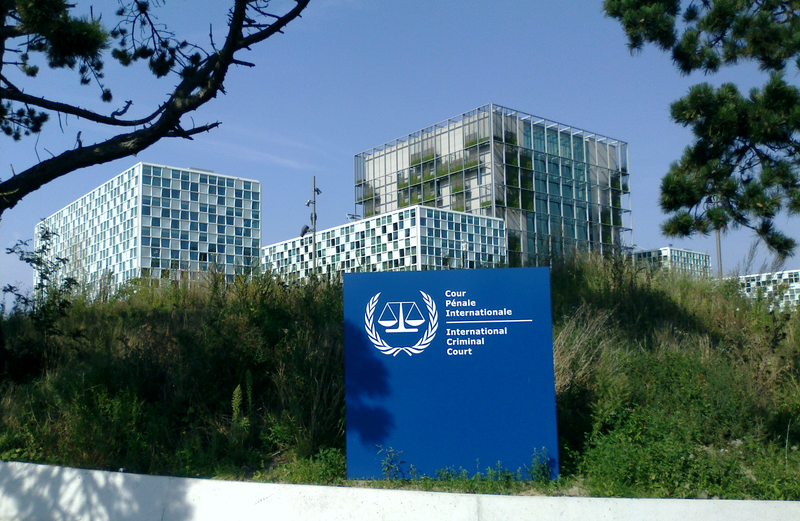By Erika V. Suhr
Image: ICC Building License: CC BY-SA 4.0
On October 27, 2017 Burundi, a year after declaring its
intentions, became the first country to withdraw from the International
Criminal Court. The timing of Burundi’s
withdrawal coincides with a report released by the United Nations Commission of
Inquiry. The report recommended that a criminal investigation on crimes
committed in Burundi be initiated in response to evidence of torture, sexual
violence, extrajudicial killings, disappearances, and illegitimate arrests and
detentions sponsored by the regime of Burundi’s president, Pierre Nkurunziza.
At the time that Burundi announced its decision to withdraw
from the Rome Statute, it seemed like it could be the leader in a wave of
withdrawals by other African nations. Many nations in Africa have criticized the
ICC as being a tool for post-colonial control of African nations and a proxy
for Western-led regime change. The ICC came under fire around the time it chose
not to pursue charges against William Ruto and Uhuru Kenyatta, Kenya’s deputy
president and president, who were both accused of violence surrounding Kenya’s
2007 election, which resulted in over 1,100 deaths and disappearances. However,
South Africa rescinded on its threat in March of last year after its High Court
ruled that Parliamentary approval was required to carry out the measure. Gambia
also backed down after a presidential election defeated the 22-year incumbent.
These political events forestalled a potential exodus from the ICC by prominent
African members.
Burundi’s exit is an illustration of what can perhaps be
expected when the Court attacks sitting officials instead of the fringe rebel
groups it has in the past. However, it might be a symptom of an underlying
fatal problem. At the very least, it presents an opportunity to reflect on the
future of the ICC, and how it will respond to its critics going forward.
For instance, the criticism cited by Burundi and other
African countries is that Africa is unfairly targeted while other world
conflicts, especially those in which Western countries are involved in, are
ignored. The ICC’s record seems to support that notion to some extent.
Presently, nine out of the ten formal investigations conducted by the ICC are
Africa-related, and all of its trials have been against African
defendants. Additionally, the glaring absence of three of the five Security
Council powers from the Rome Statute (the United States, Russia, and China)
rankles member states who see the ICC as a political instrument wielded against
the Global South. A rebuttal to this criticism might be that of the nine
African countries being investigated by the ICC, five have been referred to the
Court by their own governments. In only two cases has the ICC’s prosecutor used
her discretion to bring a case. Further, a look at the list of countries that
are being examined by the ICC reveals a less Africa-centric perspective.
Countries under “preliminary examinations” include Afghanistan, Burundi,
Colombia, Gabon, Guinea, Iraq/UK, Nigeria, Palestine, Registered Vessels of
Comoros, Greece, Cambodia, and Ukraine.
Second, the argument exists that the Court is wildly
inefficient. Since it began functioning in 2002, judges have issued only 31
arrest warrants. 25 cases have been heard before the Court and of those cases
verdicts have been issued in six of them. Ultimately, nine people have been
convicted and one was acquitted. Those results have cost over $1 billion since
the Court’s inception, and today the ICC has an operating cost of $145 million
per year. However, one might concede that investigations surrounding the
gravest human rights violations are complex and time-consuming, as evinced by
ad-hoc tribunals of isolated conflicts, such as the International Tribunal for
the Former Yugoslavia. This is especially so when there is no cooperation from
the country in which one is investigating.
There are tensions over the Court’s willingness in the
coming years to test nonmember states and regions that it has historically not
pursued. For instance, in its preliminary examination of Afghanistan, will it
encompass United States actors in its inquest, or even Afghan state actors, or
will it choose to go after dissident groups, like the Taliban, and count on
some international cooperation? Russia has already blocked two Security Council
resolutions to refer the Syrian crisis to investigation by the ICC. In face of
this opposition, how aggressively will the ICC pursue allies of the Russian
government, or the Russian government itself? Will it target the most culpable
individuals?
Notwithstanding the criticisms and the setback of Burundi’s
exit, one can say that some justice is preferable to no justice and that every
incremental step forward in prosecuting human rights offenses is a victory and
a testament to the better angels of our humanity.
As for Burundi, it is possible that it has not escaped the
Court, despite its best efforts. Under the Rome Statute, crimes in nonmember
states can still be referred to the Court for investigation by the UN Security
Council. In this case, the commission did recommend a referral. The Court has
stated that it would still claim jurisdiction over Burundi, but it might be
difficult for them to do so. The status of Burundi’s case is a preliminary
examination. For it to rise to an investigation, the ICC’s judges would have to
grant the request of the Court’s prosecutor, and Burundi will most likely argue
that there is no legal basis for them to do so now it is no longer a party.




0 comments:
Post a Comment